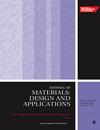Post-creep residual tensile properties of multi-walled carbon nanotube/epoxy nanocomposites
IF 2.2
4区 材料科学
Q3 MATERIALS SCIENCE, MULTIDISCIPLINARY
Proceedings of the Institution of Mechanical Engineers, Part L: Journal of Materials: Design and Applications
Pub Date : 2024-03-22
DOI:10.1177/14644207241239587
引用次数: 0
Abstract
Epoxy resin as a thermoset polymer is vulnerable to creep loading even at room temperature due to its viscoelastic nature. This study investigated the effect of reinforcing epoxy resin with different functionalized multi-walled carbon nanotubes (MWCNT) contents on the creep response and post-creep residual tensile properties of nanocomposites. The creep tests were performed on the nanocomposite specimens containing different filler contents and the neat epoxy specimen at 40°C under a constant load level of 200 N. It was found that the nanocomposites containing 0.3 wt% MWCNTs experienced 29.6%, 69.1%, and 74.1% decreases in the elastic strain, creep strain, and steady-state creep strain rate, respectively, compared to the neat epoxy. Furthermore, the tensile strength and stiffness of the neat epoxy and nanocomposite specimens were evaluated before and after a partial creep test (at a load level of 200 N for 150 min) by conducting tensile tests. The nanocomposites containing 0.3 wt% MWCNTs demonstrated considerable improvements of 35.9%, 41.2%, 27.9%, and 28.1% in strength, residual strength, stiffness, and residual stiffness, respectively, compared to the neat epoxy. Furthermore, scanning electron microscopy assessment was utilized to investigate the fracture surfaces of the nanocomposite specimens.多壁纳米碳管/环氧纳米复合材料的蠕变后残余拉伸性能
环氧树脂作为一种热固性聚合物,由于其粘弹性,即使在室温下也很容易受到蠕变载荷的影响。本研究探讨了用不同含量的功能化多壁碳纳米管(MWCNT)增强环氧树脂对纳米复合材料蠕变响应和蠕变后残余拉伸性能的影响。结果发现,与纯环氧树脂相比,含有 0.3 wt% MWCNT 的纳米复合材料的弹性应变、蠕变应变和稳态蠕变应变率分别降低了 29.6%、69.1% 和 74.1%。此外,在进行部分蠕变试验(负载水平为 200 N,持续 150 分钟)前后,通过拉伸试验评估了纯环氧树脂和纳米复合材料试样的拉伸强度和刚度。与纯环氧树脂相比,含有 0.3 wt% MWCNTs 的纳米复合材料在强度、残余强度、刚度和残余刚度方面分别提高了 35.9%、41.2%、27.9% 和 28.1%。此外,还利用扫描电子显微镜评估研究了纳米复合材料试样的断裂表面。
本文章由计算机程序翻译,如有差异,请以英文原文为准。
求助全文
约1分钟内获得全文
求助全文
来源期刊

CiteScore
4.70
自引率
8.30%
发文量
166
审稿时长
3 months
期刊介绍:
The Journal of Materials: Design and Applications covers the usage and design of materials for application in an engineering context. The materials covered include metals, ceramics, and composites, as well as engineering polymers.
"The Journal of Materials Design and Applications is dedicated to publishing papers of the highest quality, in a timely fashion, covering a variety of important areas in materials technology. The Journal''s publishers have a wealth of publishing expertise and ensure that authors are given exemplary service. Every attention is given to publishing the papers as quickly as possible. The Journal has an excellent international reputation, with a corresponding international Editorial Board from a large number of different materials areas and disciplines advising the Editor." Professor Bill Banks - University of Strathclyde, UK
This journal is a member of the Committee on Publication Ethics (COPE).
 求助内容:
求助内容: 应助结果提醒方式:
应助结果提醒方式:


